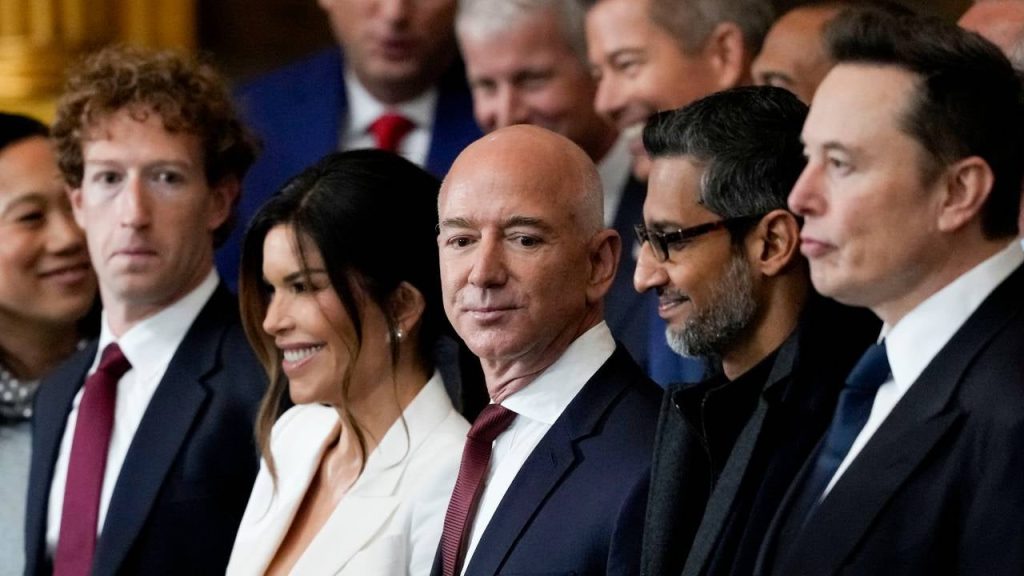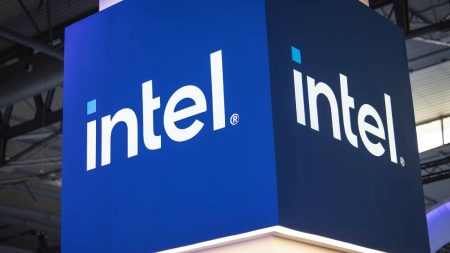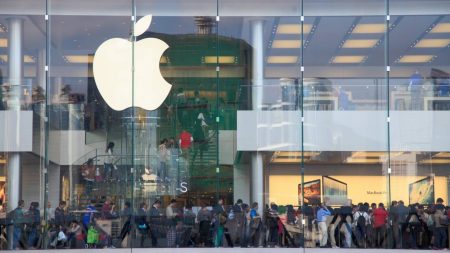The so-called Magnificent Seven stocks don’t seem so magnificent these days after new tariffs from the Trump administration sent their shares plunging, with all seven now in bear market territory.
Shares of Alphabet, Amazon, Apple, Meta Platforms, Microsoft, Nvidia and Tesla are all down at least 20 percent from their recent highs as investors grapple with how the new tariffs will impact the tech companies’ production and demand for their products and services.
The tech giants drove big gains for the broader market in recent years as enthusiasm about artificial intelligence propelled them to all-time highs. But now investors are questioning the strength of the global economy amid a new trade war, and rethinking the valuations they’re willing to place on stocks.
“It’s probably the most absurd 36 hours that I’ve ever seen,” said Dan Ives, senior equity analyst at Wedbush Securities, in an interview on Bloomberg Friday. “This is an economic Armageddon if these tariffs come through.”
Here’s how the big tech stocks could be impacted by the tariffs and how much their shares have fallen from recent highs.
How Trump tariffs impact the Magnificent Seven stocks
Tech stocks have been hit hard since President Trump announced new tariffs. Here’s how much the Magnificent Seven stocks are down from their recent highs as of midday Friday.
- Alphabet (GOOGL): -28.8 percent
- Amazon (AMZN): -26.9 percent
- Apple (AAPL): -26.3 percent
- Meta Platforms (META): -31.5 percent
- Microsoft (MSFT): -22.2 percent
- Nvidia (NVDA): -38.4 percent
- Tesla (TSLA): -50.7 percent
The precise impact of the tariffs is hard to determine and some analysts question whether or not they will last. But if they do, there’s little doubt they will have a major impact on the economy and companies. Here’s how the tariffs could impact the Magnificent Seven.
Alphabet
Alphabet, the parent company of Google, earns the vast majority of its revenue and profits from digital advertising, which could face pressure in a global economic slowdown or recession. Advertising is a discretionary expense for many companies and is an easy thing to pull back on if you aren’t seeing the benefits in higher demand. Alphabet’s cloud computing business could also see lower demand as companies rethink their spending.
Amazon
Amazon is the largest online retailer in the world and could see a major impact from the tariffs because many of its products come from places such as China. The company could also see an impact from the closing of the de-minimis loophole, which allowed goods from China valued at less than $800 to enter the U.S. without import duties. This could benefit Amazon if it reduces competition from Chinese retailers such as Temu and Shein, but these companies have also been major advertisers on Amazon’s platform.
Apple
Apple was the hardest-hit big tech stock on Thursday after the tariffs were announced due to the significant levies placed on countries where it has a manufacturing presence. China, India and Vietnam all face higher tariffs under the new policy, which could impact Apple’s iPhone, AirPods and iPad production.
“If you want $3,500 iPhones, we should build them in New Jersey, we should build them in Texas,” Wedbush’s Ives said. “If you like $1,000 iPhones, you build them in China.”
Meta Platforms
Meta Platforms, which owns Facebook, Instagram and WhatsApp, also earns most of its revenue from digital advertising, which could see pressure during a recession or slowdown. The company has benefited in recent years from major advertising spending on its platforms from Chinese retailers such as Temu and Shein, which could dry up as a result of the new tariff policies.
Need an advisor?
Need expert guidance when it comes to managing your investments or planning for retirement?
Bankrate’s AdvisorMatch can connect you to a CFP® professional to help you achieve your financial goals.
Microsoft
Microsoft has held up the best of the Magnificent Seven stocks so far following the tariff announcement, but that doesn’t mean it won’t see an impact. Microsoft has been a big spender, along with others, on data centers to support AI build-out. These data centers could become even more expensive because many of their components come from countries that now face significantly higher costs.
Nvidia
Nvidia has been the biggest winner of the boom in AI spending, but that spending could be at risk if companies begin to pull back due to the trade war and a possible economic slowdown. Semiconductors have long been a target of trade policy and Trump has singled out Taiwan as “stealing” the U.S. chip industry. Semiconductors were exempt from the tariffs announced on Wednesday, but a plan for targeted tariffs on chips is expected in the future, according to reports.
Tesla
Electric-vehicle maker Tesla could also see an impact from tariffs. China announced new reciprocal tariffs of 34 percent on U.S. goods Friday, escalating the trade war with the U.S. Tesla has manufacturing plants in China and generated more than 20 percent of its overall revenue in China during 2024.
Tesla has also suffered from brand damage with consumers due to CEO Elon Musk’s close ties to the Trump administration. Musk contributed more than $200 million to help reelect Trump and has been charged with making cuts to the federal government through the Department of Government Efficiency (DOGE).
Read the full article here












